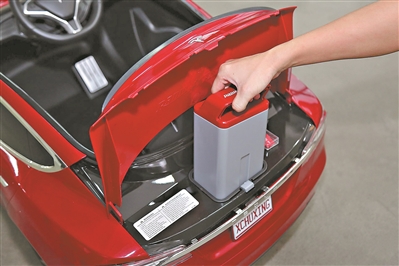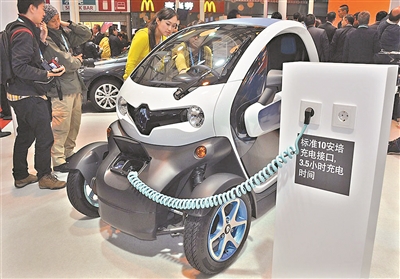

Power battery replacement is expensive, and many car companies regard "battery replacement" as one of the main directions for designing pure electric vehicles in the future.
New energy vehicles are gradually entering thousands of households, but for some users who ate "crabs" early six or seven years ago and bought pure electric vehicles, they are now facing new troubles — — The cost of changing the battery is more expensive than the original price of buying a car! All-media reporters learned from market interviews that the current service life of automobile power batteries is mostly 5-8 years, which means that the power batteries of the first batch of new energy vehicles put into the market during 2009-2013 have entered the "retirement" period. In view of this situation, let’s see what new tricks car companies have.
Text, photo: Guangzhou Daily all-media reporter Deng Li
[Change the "electricity" scene] The battery is scrapped and the car is "scrapped"!
The owner, Mr. Chen, bought a Chery EQ electric car four years ago. After the subsidy, the price of the new car was about 65,000 yuan. Recently, after a heavy rain, the car was soaked in water and the battery was scrapped! After dragging it to the 4S shop, the car dealer told him that he had to replace the battery, but the cost was nearly 70,000 yuan! Mr. Chen was dumbfounded, which is thousands of dollars more expensive than buying a new pure electric car! In this regard, 4S stores also expressed helplessness: because there is no separate subsidy policy for automobile power batteries, the price of battery replacement is very expensive.
All-media reporters noticed that at present, because the price of "battery replacement" of many independent brands of pure electric vehicles is higher than that of buying new cars, in the event of battery failure, most car owners give up replacing batteries and directly scrap their vehicles. It is also very expensive to change batteries for imported new energy vehicles. Some people have calculated that a Tesla Model S with a price of 700,000 yuan to 800,000 yuan needs more than 300,000 yuan to replace batteries, so you can buy a BMW.
[Market survey]
The battery is guaranteed for 5~6 years, but there are constraints.
All-media reporters noticed that the current state requires the key components of new energy vehicles (batteries, electronic controls, motors) to provide a warranty of not less than 5 years or 100,000 kilometers. During the warranty period, the owner’s maintenance is completely free.
The reporter searched a number of automobile brands and found that BYD Qin currently provides "a six-year or 150,000-kilometer warranty for the whole vehicle and a lifetime warranty for the battery"; SAIC Roewe has provided E50 vehicles with 3-year and 100,000-kilometer warranties, as well as 5-year and 100,000-kilometer battery core component warranties, and some models also have battery decay warranties; BAIC provides a five-year unlimited-kilometer commitment for the battery of E150ev, and users who purchase the new EX260/EU260 before April this year can enjoy the lifetime warranty service of the battery. Generally speaking, at present, the mainstream new energy vehicle companies only guarantee the whole vehicle, and only a few manufacturers have an extra warranty for the battery for a long time. In terms of foreign automakers, Tesla has just changed the warranty terms of the Model S drive and battery pack of electric vehicles to 8 years of unlimited mileage.
Despite this, the cost of replacing batteries as high as 60,000 to 70,000 yuan is still in the minds of car owners. If the warranty period ends after 5~8 years, and the life of the battery just ends, then the owner will have to make a headache choice between replacing the battery or scrapping the vehicle; If the battery is within the service life and there is a problem that is not covered by the warranty (such as soaking in water), it may be necessary to break up the battery after seeing that other parts of the vehicle are still in good condition, because the high battery replacement bill is very "disgusting".
[Current Scheme]
The manufacturer’s policy encourages "replacement" in three or four years.
However, replacing the whole battery is not the only solution. The engineer of JAC pure electric vehicle clarified to the reporter: With the development of technology, if there is a problem with the current battery, it is no longer necessary to replace the whole battery as it was a few years ago. Now it is only necessary to replace one or several corresponding faulty batteries. The engineer told the reporter that the cost of a single battery is only a few hundred dollars, and the working hours are up to one or two thousand yuan. In general, it is cheaper than the engine maintenance of fuel vehicles.
However, there are many problems in the use of electric vehicles, and the high cost of batteries still inevitably becomes a resistance for many people to buy. The reporter noticed that many car companies started the "buy-back plan" to solve the problems of fast depreciation and fast battery loss of pure electric vehicles, and encouraged consumers to replace new pure electric vehicles in three or four years. For example, at the beginning of the listing of Yundu New Energy, a three-year repurchase policy was introduced at the same time, and the guaranteed price of its pure electric vehicle was 50% of the original price.
All-media reporters also noticed from the second-hand market that the current depreciation of second-hand new energy vehicles is faster than that of ordinary fuel vehicles. For example, in 2013-2014, the price of Beiqi E150EV in the second-hand market ranged from 20,000 to 40,000 yuan. After the updated Beiqi EX360 went on the market, manufacturers also complied with the repurchase and replacement policy. As long as the car condition of the old pure electric vehicle meets the official standards, it can offset the purchase price of 39,800 yuan, which is much more cost-effective than direct scrapping. In doing so, manufacturers not only encourage consumers to trade in old ones for new ones, but also help consumers avoid the embarrassment of finding out that the battery life has ended after six or seven years of use and being forced to scrap their vehicles.
[Car enterprise goal]
Load a detachable battery
Perhaps it is precisely because the high cost of batteries has aroused the concerns of users, and many car companies regard "battery replacement" as one of the main directions for designing pure electric vehicles in the future. It only takes three to five minutes, and a "blood tank is empty" battery is directly removed and replaced with a new battery with full charge. Although the power exchange technology has not been verified by a large number of landing operations, this idea is favored by many new energy vehicle companies.
Traditional car companies, such as BAIC New Energy, have taken the lead in distributing in several cities across the country since last year to carry out the service of "changing power stations". After the taxi industry has achieved good response, this year, the "changing power" model has been extended to the field of pure electric private cars in Beijing. As for the new car-making enterprises, it has been included in the research and development category. Previously, Tesla had announced a 15-minute power exchange technology; Weilai, the representative of China’s new car manufacturers, plans to build more than 1,100 power stations nationwide in 2020, hoping to let car owners realize "changing electricity within 3 kilometers" in the central areas of first-tier cities such as Beishangguangshen and Shenzhen; Another new car manufacturer, Chehejia’s first SEV, its biggest highlight is the use of detachable batteries, which is also the official claim that they do not rely on the capital of charging piles.
China new energy vehicles ushered in the first peak of power battery scrapping.
In 2009, China officially launched the demonstration and promotion of "10 cities and 1000 vehicles" new energy vehicles.
From 2012 to 2014, demonstration applications were conducted in the north, Guangzhou and Shenzhen, and new energy vehicles entered the era of private consumption.
In 2015, the sales volume of new energy vehicles in China was 331,000, of which 247,000 were pure electric vehicles, ranking first in the world.
In 2017, the sales volume of new energy vehicles in China reached 777,000, ranking first in the world for three consecutive years.
In 2018, the first batch of new energy vehicle battery systems will enter the "seven-year itch" elimination period, which will usher in the first peak of power battery scrapping.
In recent years, the relevant state departments have paid extra attention to the market guidance of battery recycling. At the same time, the data of the Ministry of Industry and Information Technology shows that the first peak of power battery scrapping will be ushered in 2018. Gao Yunhu, director of the Department of Energy Conservation and Comprehensive Utilization of the Ministry of Industry and Information Technology, pointed out that it is necessary to accelerate the recycling of power batteries for new energy vehicles and implement the formulation and implementation of pilot programs. On August 1st, the Interim Measures for the Management of Recycle and Utilization of Power Batteries for New Energy Vehicles was promulgated and implemented. In September, the Ministry of Industry and Information Technology issued the List of Qualified Enterprises (First Batch).
关于作者